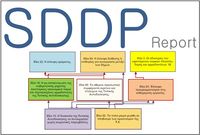SDDP URVT 19 12 2008
SDDP_URVT Identifying the challenges and barriers to the asylum procedure in Cyprus
Executive Summary
The workshop organized by the Unit for the Rehabilitation of Victims of Torture in collaboration with Future Worlds Center. Aims to examine the current asylum procedure and the determination of an ideal future development processes. I used the method Republican Structured Dialogue (see below).
The workshop aims to bring together all involved governmental and non-governmental organizations working with asylum in Cyprus, namely the Asylum Service, the Fund, the Reviewing Authority, the Ministry of Labour, the Police, the Department of Welfare, the Department of Civil Registry and Migration and UNHCR United Nations High Commissioner for Refugees (UNHCR).
All participants will take part in a structured democratic dialogue and, through the long and rich experience, we are able to help develop a common vision for a better understanding of the challenges of the asylum process in Cyprus. At the end of the workshop, you will have created a 'map challenges "based on consensus and common ground of ideas for all participants. The map will illustrate the influence and interconnection between different ideas. It can therefore be used as a basis for creating strategy and an action plan. The method requires the use of a "guiding question" which defines the structure of the dialogue.
The Triggering Question (TQ) for this SDDP was:
- What challenges / obstacles are we facing as stakeholders in our efforts to establish and operate a more balanced and effective asylum procedure in Cyprus?
In response to the TQ, the participants came up with 66 obstacles, which were categorized in 7 clusters. Following the voting process, 16 ideas received one or more votes, but only 10 ideas, that received 14 or more votes, were structured to create the influence MAP shown below.
Methodology
The workshop will be conducted through the methodology of "Structured Dialogic Design Process" (Structured Dialogic Design Process, SDDP) known as Structured Democratic Dialogue. The SDDP allows the team involved to discuss an issue with a structured and democratic way that allows us to achieve practical results. It is a deeply reasoned, scientific, psycho-social methodology has evolved over the past 30 years in its current form. Helps build consensus and solve complex problems.
The workshops SDDP contribute the following ways:
• To help participants reach a common understanding of the problem. • To uncover the root causes (roots of the problem). • Contribute to the consensual adoption of action plans. • To create groups dedicated to the implementation of projects. • to establish lasting ties based on respect, trust, and cooperation.
The workshops SDDP achieve these results through respecting the autonomy of all participants and the use of a toolkit consensus including discipline, technology, and graphics ideas that allow participants to control the discussion. The methodology SDDP developed to help understand and solve complex social systems (complex societal systems). It has been adopted successfully around the world in situations of uncertainty and conflict. At European level, the method has been used by four European networks of experts with participation of about 20 countries each time.
